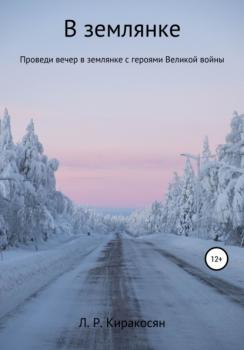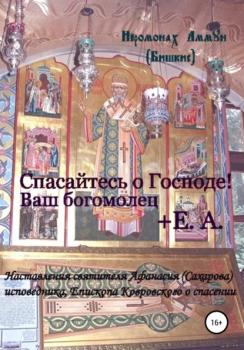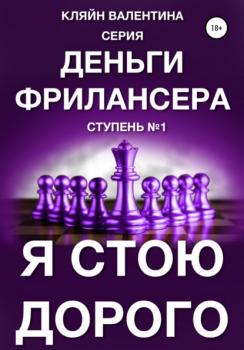Автор
Все книги издательства АвторВ землянке
Война – это не только тяжелые бои, опасные диверсии и подвиги героев, пожертвовавших собой ради счастливого будущего грядущих поколений. Это еще и обыкновенные, спокойные вечера, проведенные в землянках между боями. Хотелось бы Вам оказать в одном из таких и увидеть собственными глазами этих людей, узнать их судьбы, и услышать, о чем они говорят и думают? Тогда этот рассказ для Вас. В нем рассказывается о самом обычном вечере в самой обычной землянке во время самой жестокой и беспощадной войны.
Агентство Innoclean
Этот небольшой рассказ в стиле эротической фантастики, переносит нас в не такое уж далекое будущее, когда роботы постепенно войдут в сферу услуг и будут неотличимы от человека, а в чем-то даже лучше людей, технологии – это не угроза, а всего лишь инструмент, который можно использовать различных целях делая при этом свою жизнь более комфортной. В рассказе молодой человек начавший взрослую жизнь вызывает девушку для уборки своей съемной квартиры и он даже не догадывается что его ждет, этот день сделает его жизнь совершенно иной и выбор сделанный в начале взрослой жизни повлияет на всю его жизнь, приятного чтения.
VHS
Сборник стихотворений Лебы Вафельниковой разрубает Луну надвое: на одной её половине, «Раньше», время идёт вспять, уводя всё дальше от текстов 2012 года, на другой же, «Позже», вихрится спиралями к последнему, что было написано. Мистическая связь между двумя полукружьями, впрочем, сохраняется – иначе не объяснить бушующий от собственного магнетизма океан искренности, шум которого пробивается к нам со старых видеокассет. Сборник зарисовок Лебы Вафельниковой – калейдоскоп вымышленных событий, витраж запертых чувств. Сюжетом является переживание, каждый текст – это выдох, на котором сообщается секрет. Если, конечно, вы умеете его хранить.
Макферсонский Наполеон
"Макферсонский Наполеон" – это отнюдь не первое название, которое, скажем так, "прилипало" к этому, скажем так, "произведению". Самым долговечным черновым названием было "кошка сдохла", но мне сообщили, что оно и слишком грубо, и слишком мрачно. Потому… Это повесть о человеке, которому удалось выполнить нетрудную задачу: стать Наполеоном небольшого американского городка. Это повесть о его жизни, жизни его подданных и жизни его Жозефины.
Амарант
Странная пара – разумная птица и человек, который умер век назад – идет спасать мир. Мир, в котором пропало солнце и единственным светилом осталась Луна, но и она погаснет, если не приносить ей в жертву жизни избранных. Мир, в котором появление из вод гигантского левиафана сводит людей с ума. Мир, где властвуют таинственные невидимые хозяева, способные превратить человека в монстра или подарить ему бессмертие. Многие считают, что этот мир обречен, но герои уверены, что его можно спасти. Вопрос – нужно ли? И станет ли этот мир лучше после спасения?
Маскарад снов
Когда-то экспериментаторы решили оживить легенду о Маске, выбирающей своих игроков. Начинается она с карнавала и заканчивается испытаниями, требующими от участников не только смелости и ловкости, но и высокого интеллекта. Поставив на кон жизнь, победитель получит все. О доле проигравшего лучше не думать. В настоящее время «игра Маски» под запретом, но желающих окунуться в тайну с головой все еще несметное количество. Главная героиня готова пожертвовать всем для того, чтобы вернуть самое дорогое в своей жизни. Однако стоит ли оно того? Открывая завесы чужих тайн на фоне бескрайних пейзажей, девушка начинает сомневаться… или все же лучше понимать себя?
Сонные сказки
Иногда очень сложно уложить ребенка спать. Каждый вечер уходит много сил и времени, чтобы угомонить маленького непоседу. А может быть, ребенок стал бояться темноты или ему приснился страшный сон. В эту книгу я собрала сказки в помощь родителям. Три сказки, которые помогут ребенку расслабиться и настроиться на спокойный сон. Сказка про Фею снов, которая дарит детям хорошие сны. Сказка "Почему луна улыбается?" Она отправилась в путешествие в поисках чуда. Третья сказка релаксационная, она поможет ребенку расслабиться. Обязательно читать тихим голосом.
Спасайтесь о Господе! Ваш богомолец Е.А. Наставления святителя Афанасия (Сахарова) исповедника, епископа Ковровского о спасении
Книга-размышление о духовных наставлениях св. Афанасия Ковровского (в миру Сергей Григорьевич Сахаров) о спасении человека.
Бумеранг
В книге стихов «Бумеранг» автор размышляет о том, что зло возвращается бумерангом. Америка бросив бумеранг Советскому Союзу получила его обратно. А неблагодарная Европа жировавшая на российском газе превращается в нищую старуху. Иллюстрация обложки была создана с помощью нейросети ruDALL- E.
Я стою дорого. Серия «Деньги фрилансера». Ступень №1
Фрилансер – специалист, ведущий частную практику: массажист, фотограф, юрист, дизайнер, репетитор, остеопат, тренер, астролог, психолог, риелтор, логопед, маркетолог, специалист по настройке рекламы, мастер по маникюру, страховой агент, стилист, косметолог и так далее. Книга «Я стою дорого» является начальной ступенью №1 в серии «Деньги фрилансера». В ней в виде диалогов приведены дословные клиентские истории, которые покажут, как фрилансеру психологически «выравниваться» в непростых ситуациях, связанных с финансами. Сложно с клиентами говорить о деньгах, тяжело поднимать цену. Подниму, а что обо мне подумают? А вдруг после поднятия цены клиентов совсем не будет? Клиентов совсем мало. Клиенты просят скидки или просят оказать услугу бесплатно. Клиенты спрашивают «а что так дорого?» или и вовсе просят вернуть деньги за полученную услугу. Основные описанные в книге рабочие инструменты: ДПДГ (десенсибилизация и переработка движением глаз), методы «Дойти до дна», «Пустой стул» и другие.









